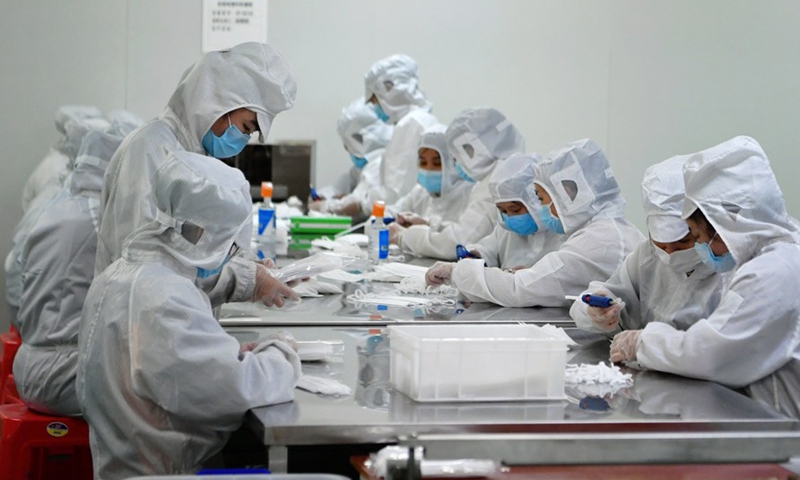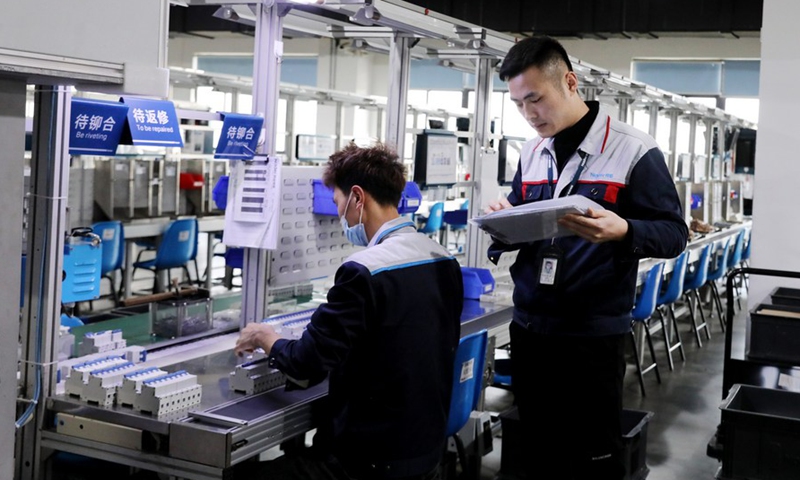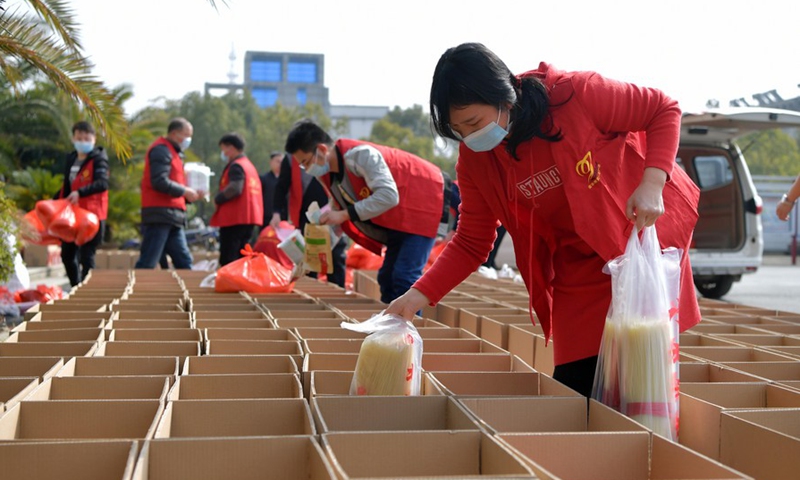The humming factory of New Yifa Group in the city of Putian, east China's Fujian Province, offers a glimpse of the boisterous production activities during the Chinese Spring Festival holiday season when factories traditionally shut down for weeks, and workers, mostly from inland provinces, return home for family gatherings.
Following the recent resurgence of sporadic COVID-19 cases, China has encouraged people to stay put over the holiday to reduce the risk of infections during the travel rush.
A measure to help contain the virus spread, the stay-put policy will also help ease post-holiday labor shortages and result in an early work resumption compared to the usual schedule after the holiday this year.
Stay put, stay busy
Hu Aihua, in charge of the manufacturing department of healthcare products in New Yifa, had already made up his mind to stay in Putian for the upcoming holiday long before the government's stay-put advice for fear of being stranded in his hometown after the holiday like last year.
The 40-year-old manager is from the city of Yichang in central China's Hubei Province, which was hit hard by the coronavirus outbreak and put on lockdown last spring. On March 20, he rushed back to the company as soon as the lockdown was lifted.
"The company was in desperate need of staff back then, but I was trapped hundreds of miles away and could do nothing about it," Hu said. "I won't take any chances this year."

Workers make face masks at a workshop of New Yifa Group in the city of Putian, southeast China's Fujian Province, Feb. 7, 2020.Photo:Xinhua
Fewer than 10 people among the company's migrant workers will be going home for the holiday this year, as the factory will be running full steam to meet the global demand. "Orders from Europe and the United States for facial masks and disinfectant wipes are piling up, so we will make full use of this holiday by generating production," Hu said.
Most factories in China used to suspend operation for about a month or even longer during the Spring Festival break in the past, this year, however, factories are generally offering a 10-day break for those who choose to stay. "It will definitely shore up production and help factories complete overseas orders ahead of time," said Zhou Yinggang, an economist with Xiamen University.
In addition to more workdays, experts say the "stay-put" approach will also help factories secure enough workers after the holiday.
Shanghai Liangxin Electrical Co., Ltd., a leading low-voltage device supplier, encountered a manpower shortage and could not resume full production until April last year due to the raging epidemic.
"February-March period is the peak season for us, during which we will generally face a labor shortage. But as more workers are staying put this year, we will be able to resume production very quickly after the holiday," said Ren Silong, president of the company.
"The 'stay-put' policy will boost China's export and economic growth," said Liu Shuguang, an economist with China Foreign Affairs University, adding that it will in turn help stabilize and safeguard the global supply chain during these tough times.
Holiday subsidies
Cui Shangfu, a worker in Liangxin, decided to spend the holiday with his wife in the factory, partly because of the generous subsidies offered to migrant workers.

Cui Shangfu, a worker in Shanghai Liangxin Electrical Co., Ltd., makes records at a workshop of the company in Shanghai, east China, Feb. 2, 2021.Photo:Xinhua
In order to encourage employees to stay, the company promised to pay each worker 3,640 yuan (about 563 U.S. dollars) worth of subsidies if they stay in Shanghai for the holiday from Feb. 6 to 21. Those who work during this period will enjoy a double or triple payment as stipulated by law.
Among the company's 2,400 employees, 90 percent are migrant workers, and 90 percent of them will be staying put during this year's Spring Festival, Ren said.
Zheng Junjie, president of New Yifa, said the company used to cover employees' travel expenses to encourage their return to the factory, but this year, the company will pay subsidies to those who do not return home.
"We have renovated facilities like gyms and reading rooms, and planned to organize several hiking activities during the holiday so they won't get bored," Zheng said.
The companies' policies echo the "stay-put" call from a number of Chinese cities. For instance, Quanzhou, a manufacturing hub for shoes and garments, said it will offer red packets, free movie tickets, and free entry to top local tourism spots for all migrant workers who choose to stay during the holiday.

Staff members of local government package local specialties in Shuibei Township of Xinyu City, east China's Jiangxi Province, Feb. 3, 2021, before delivering them as Chinese New Year gifts for migrant workers who will not come back home during the Spring Festival holiday.Photo:Xinhua
According to trade union authorities in Shanghai, special attention and home visits will be paid to migrant workers in factories, construction sites, and logistics and food delivery industries, as well as employees in emerging industries such as internet-related industries.
It has also advised trade unions at all levels to offer free cellular data and top-up cards to non-local employees to facilitate communication with their family back home via video calls.
Festive joy for everyone
As more coastal cities are trying to allure migrant workers to stay, local governments of their hometowns are also making efforts to fill in the void of what they will be missing -- local delicacies, children and old parents.
He Yanping, an auxiliary police official in Xiamen, east China's Fujian Province, received a "gift parcel" from his hometown in Jiangxi Province, located more than 680 km away.
The parcel had homemade delicacies and a letter, sent from the local government of Shuibei Township in Jiangxi to convey a warm gesture to migrant workers for the upcoming holiday. "Homemade food is precious. It could not be bought from any luxury restaurant," He said.
"The package is an expression of gratitude and our care for the migrant workers as they sacrificed the opportunities for family reunions to ensure a safe holiday for the entire country," said Xie Tao, Party chief of Shuibei Township.

Community staff visit villagers and help them chat with their son who works in south China's Guangxi Zhuang Autonomous Region, via video link, in Quantang Village of Shuibei Township in Xinyu City, east China's Jiangxi Province, Feb. 3, 2021. Photo:Xinhua
Meanwhile, spending a holiday without parents is "not that painful" for nine-year-old Mingyu (pseudonym) from Xiashi Village, Wan'an County, Jiangxi. The presence of a local guardian fills in the void for Mingyu and other such left-behind kids.
Wang Manxiang, director of the child welfare office in Xiashi, has been a guardian to 11 such left-behind children in her village since her appointment in August 2020. "We have prepared New Year presents for them. As a guardian of left-behind children, I want them to feel the warmth of maternal love," Wang said.
In January, the Ministry of Civil Affairs called on local officials to regularly visit children and the elderly with no one taking care of them to learn their needs and provide assistance in a timely manner.
In Wan'an County, a total of 40 guardians were appointed to tend to 1,415 left-behind children and 56 children in need, said Xiao Xiaolian, deputy director of the civil affairs bureau of Wan'an.
Xiao added that all villages with guardians have set up service points, equipped with office supplies like computers, toys, stationery items, and sports goods, for the left-behind children.
